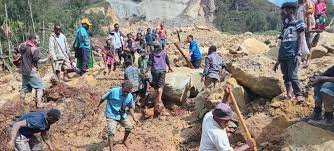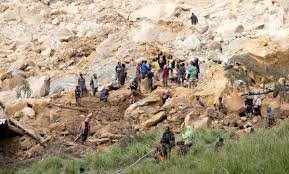Massive Landslide in Papua New Guinea Buries Entire Village
Papua New Guinea, a country known for its rugged terrain and frequent natural disasters, recently witnessed a devastating event as a massive landslide buried an entire village under tons of mud and debris. The incident occurred in the remote highlands of the country, leaving hundreds homeless and prompting a massive rescue operation.
The Tragedy Unfolds
The landslide, triggered by heavy rainfall and unstable soil conditions, struck the village with little warning, catching residents off guard. Within moments, houses were engulfed, and roads were rendered impassable, hampering rescue efforts.
Humanitarian Crisis
The aftermath of the landslide has led to a humanitarian crisis in the region. With homes destroyed and infrastructure severely damaged, survivors are left without shelter, clean water, or basic amenities. Rescue teams, including local authorities and international aid organizations, are racing against time to reach affected areas and provide assistance.
Environmental Vulnerability
Papua New Guinea’s rugged terrain and tropical climate make it highly susceptible to natural disasters such as landslides and earthquakes. Deforestation, mining activities, and improper land use further exacerbate the country’s vulnerability to environmental hazards, highlighting the need for sustainable development practices and disaster preparedness measures.

Why this News is Important
Humanitarian Concerns
The massive landslide in Papua New Guinea highlights the urgent need for international attention and assistance in addressing humanitarian crises triggered by natural disasters. It underscores the vulnerability of communities living in high-risk areas and the importance of disaster preparedness and mitigation strategies.
Environmental Conservation
The incident underscores the critical importance of preserving natural ecosystems and implementing sustainable development practices to mitigate the impact of environmental degradation on vulnerable communities. It serves as a stark reminder of the consequences of deforestation, improper land use, and unchecked industrial activities on the environment and human lives.
Global Solidarity
The international response to the landslide reflects the spirit of global solidarity and cooperation in times of crisis. It demonstrates the willingness of the international community to come together to support affected populations and provide much-needed relief and assistance.
Historical Context
The highlands of Papua New Guinea are prone to landslides due to their rugged terrain, steep slopes, and tropical climate. Deforestation, mining activities, and agricultural expansion have further destabilized the region’s fragile ecosystem, increasing the risk of natural disasters such as landslides and floods. In recent years, the frequency and severity of such events have intensified, posing significant challenges to local communities and authorities.
Key Takeaways from “Massive Landslide in Papua New Guinea Buries Entire Village”
| Serial Number | Key Takeaway |
|---|---|
| 1 | The landslide in Papua New Guinea was triggered by heavy rainfall and unstable soil conditions. |
| 2 | The incident has resulted in a humanitarian crisis, with hundreds of people left homeless and in need of assistance. |
| 3 | Papua New Guinea’s rugged terrain and tropical climate make it highly susceptible to natural disasters such as landslides and earthquakes. |
| 4 | The landslide highlights the importance of disaster preparedness and mitigation strategies in vulnerable regions. |
| 5 | International solidarity and assistance are crucial in addressing humanitarian crises triggered by natural disasters. |
Important FAQs for Students from this News
Q1: How did the landslide in Papua New Guinea occur?
A1: The landslide was triggered by heavy rainfall and unstable soil conditions in the remote highlands of the country.
Q2: What are the immediate challenges faced by survivors of the landslide?
A2: Survivors are facing challenges such as lack of shelter, clean water, and basic amenities due to the destruction caused by the landslide.
Q3: What factors contribute to Papua New Guinea’s vulnerability to natural disasters?
A3: Factors such as rugged terrain, tropical climate, deforestation, mining activities, and improper land use contribute to the country’s vulnerability to natural disasters.
Q4: How has the international community responded to the landslide in Papua New Guinea?
A4: The international community has responded by providing humanitarian assistance and support to affected populations through relief efforts and aid organizations.
Q5: What lessons can be learned from the landslide incident?
A5: The incident underscores the importance of disaster preparedness, sustainable development practices, and global solidarity in addressing humanitarian crises triggered by natural disasters.
Some Important Current Affairs Links

















